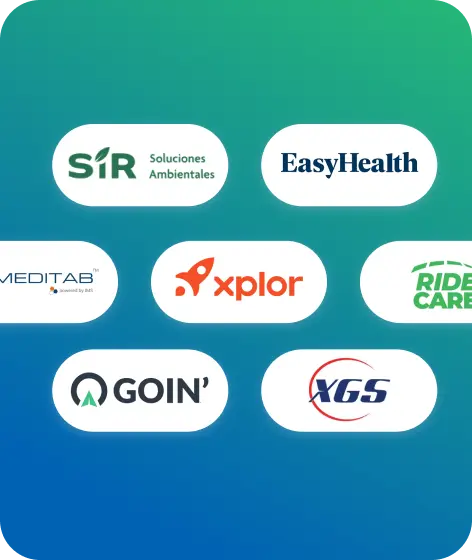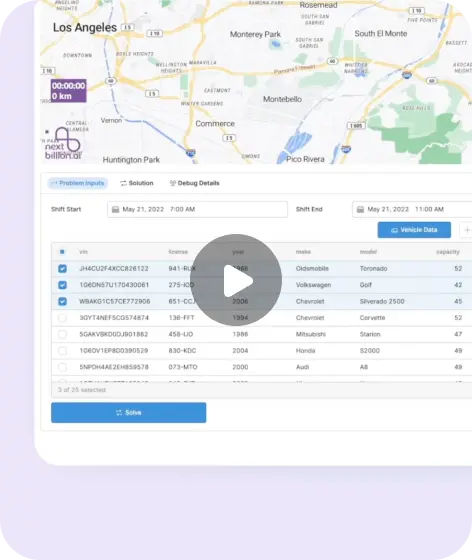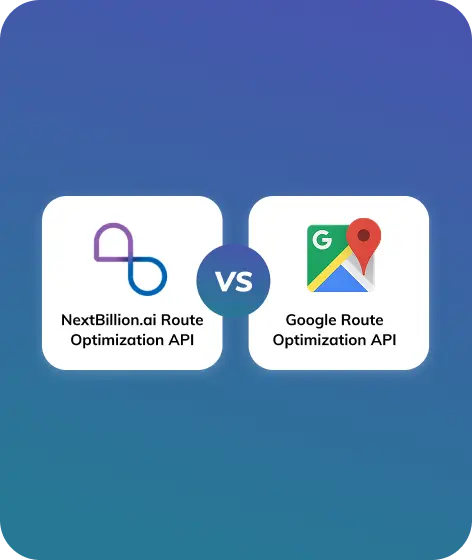In today’s fast-paced world, the trucking industry must have access to cutting-edge route optimization and fleet-management solutions. These solutions are essential for managing complex logistical challenges and meeting the increasing demand for efficient transportation solutions.
Picking the right solution can make or break a company in the fast-paced trucking world. With competition rising and rules changing constantly, it’s important for people who make decisions to buy a platform that not only meets their needs now but also grows with their plans for the future.
NextBillion.ai and Google CFR are leading names in the trucking business, offering solutions to make operations run more smoothly and efficiently. Each has its own features and benefits.
This article aims to give trucking industry leaders the knowledge and insights to choose wisely between NextBillion.ai and Google CFR. We’ll discuss the features, benefits, and abilities of each solution so that you can make an intelligent choice that helps your business grow. Let us begin!
Understanding NextBillion.ai’s Trucking Industry Solutions
NextBillion.ai offers a comprehensive suite of solutions tailored specifically for the trucking industry, empowering businesses to optimize their operations, enhance efficiency, and ensure compliance with regulations. Let’s explore the most suitable solutions for the trucking industry:
Route Optimization API
NextBillion.ai’s Route Optimization API is a powerful tool equipped with over 50 constraints and customizable objectives. It allows businesses to fine-tune their route planning process, considering factors such as traffic conditions, delivery schedules, vehicle capacities, etc. By leveraging this API, companies can minimize fuel consumption, reduce delivery times, and maximize resource utilization.
Navigation API & SDK
For trucking companies navigating through complex road networks while adhering to regulations is paramount. NextBillion.ai’s Navigation API & SDK provides regulation-compliant, adaptive, turn-by-turn navigation guidance tailored specifically for trucking operations. This ensures drivers are directed along the most efficient and legally permissible routes, minimizing the risk of delays, fines, and accidents.
Road Editor API and Tool
The Road Editor API offered by NextBillion.ai enables businesses to incorporate custom truck-specific road closures, restrictions, speed limits, and other relevant data in real time. This level of customization ensures that route planning and navigation systems are accurately informed about any temporary or permanent changes in road conditions, allowing companies to proactively adjust their logistics operations accordingly. This capability is also available in a no-code UI-based tool through our NCC console.
Contact us or Book a demo to learn more about the tool.
Live Tracking API
Real-time tracking and monitoring of assets is essential for efficient fleet management. NextBillion.ai’s Live Tracking API allows businesses to monitor the location and activity of their assets in real-time. Moreover, it offers alerts and notifications to keep stakeholders informed about critical events such as delays, diversions, or unauthorized stops, enabling proactive intervention when necessary.
Distance Matrix API
Accurate estimation of travel times and distances is crucial for effective logistics planning. NextBillion.ai’s Distance Matrix API enables businesses to calculate precise ETAs (Estimated Time of Arrival) and distances, even for large matrices of up to 5000 x 5000 elements. This capability ensures companies can make informed decisions regarding route planning, scheduling, and resource allocation.
Geofencing API
NextBillion.ai’s Geofencing API empowers businesses to define virtual boundaries based on travel time and distance. This functionality is invaluable for optimizing delivery routes, monitoring driver behavior, and enhancing security. By setting up geofences, companies can receive alerts when vehicles enter or exit predefined zones, enabling them to manage their operations better and respond promptly to any deviations from planned routes.
In summary, NextBillion.ai’s trucking industry solutions offer a comprehensive array of APIs, SDKs, and tools designed to address the unique challenges logistics and trucking companies face. From route optimization and navigation to real-time tracking and geofencing, these solutions enable businesses to streamline their operations, enhance efficiency, and ensure compliance with regulations, ultimately driving success in a highly competitive industry.
Exploring Google CFR in the Trucking Industry
Google doesn’t offer a single solution optimized for the trucking industry. Google Cloud Fleet Routing and Fleet Engine solutions can be integrated for fleet-wide route optimization.
Cloud Fleet Routing
Google Cloud Fleet Routing addresses complex routing needs such as delivery planning and vehicle routing while considering constraints like pickup time and package weight. It offers both asynchronous and near-real-time routing plan creation based on fleet size and complexity.
Fleet Engine
Fleet Engine is part of Google’s Last Mile Fleet Solution services, enabling fleet modeling, driver activity planning, and real-time package tracking.
It is accessible via mobile client SDKs, server-side Java libraries, or REST APIs.
Workflow
In daily delivery operations, Cloud Fleet Routing and Fleet Engine collaborate to facilitate route optimization workflows. The route optimization workflow is explained below:
- Initial Route Planning: Route plans are defined using a route solver and input into Fleet Engine for visibility, execution, and tracking.
- Re-optimization: Specific routes can be selected mid-day to address changes and re-optimize for a smoother driver and customer experience.
- New Stop Allocations: Ad hoc pickup requests or new stops can be allocated across existing routes, ensuring flexibility and efficiency.
Limitations and Challenges of Google CFR in the Trucking Sector
While Google Cloud Fleet Routing (CFR) offers powerful capabilities for route optimization in the trucking sector, it also faces certain limitations and challenges:
- Complexity of VRPs: While CFR is adept at solving vehicle routing problems (VRPs), some VRPs in the trucking sector can be highly complex, involving numerous constraints and variables. CFR may struggle to provide optimal solutions for extremely intricate routing scenarios.
- Scalability: CFR’s performance may degrade when handling large-scale routing problems, especially when dealing with a high volume of vehicles, locations, and constraints. As the size of the VRP increases, CFR may experience challenges in delivering timely and efficient route plans.
- Real-Time Adaptability: While CFR supports near-real-time route optimization, there may be limitations in its ability to dynamically adapt to rapidly changing conditions such as traffic congestion, accidents, or weather disruptions. This could result in suboptimal routes or delays in response to unexpected events.
- Customization Constraints: CFR provides flexibility in defining VRPs and constraints, but it may not fully accommodate all the specific requirements and nuances of individual trucking operations. Customization options may be limited, leading to scenarios where certain constraints cannot be adequately addressed.
- Integration Challenges: Integrating CFR into existing fleet management systems and workflows may pose challenges, particularly for businesses with complex IT architectures or legacy systems. Ensuring seamless communication and data exchange between CFR and other systems may require significant effort and resources.
- Cost Considerations: While CFR offers valuable features, utilizing its services may incur costs, especially for organizations with large fleets or frequent routing needs. Balancing the benefits of CFR against the associated costs is essential for maximizing its value proposition in the trucking sector.
- Regulatory Compliance: CFR may face challenges in ensuring compliance with regulatory requirements specific to the trucking industry, such as restrictions on vehicle dimensions, weight limits, and hours of service regulations. Ensuring that CFR-generated routes adhere to relevant regulations is crucial for avoiding penalties and legal issues.
Overall, while Google CFR provides a powerful tool for optimizing trucking routes, businesses need to carefully evaluate its limitations and challenges to leverage its capabilities while addressing their unique operational requirements effectively.
How Does NextBillion.ai Address Specific Challenges in the Trucking Industry?
NextBillion.ai addresses specific challenges in the trucking industry by offering comprehensive solutions tailored to optimize trucking operations:
1. Regulation-Compliant Routes
NextBillion.ai generates routes that adhere to trucking regulations, considering factors like truck dimensions and hazmat restrictions. By tailoring routes to avoid restricted areas and comply with safety regulations it ensures safe and legal transit for commercial vehicles.
2. Hours of Service (HOS) Compliance
NextBillion.ai designs long-haul routes that comply with safety administration rules, including built-in schedules and breaks to adhere to HOS regulations. This ensures drivers maintain compliance with regulations governing maximum driving hours and rest periods.
3. Toll and Toll-Free Route Selection
NextBillion.ai offers flexibility in route planning by allowing businesses to select routes that either include or avoid tolls, ferries, tunnels and highways based on preferences and operational needs. This enables businesses to minimize costs and optimize routes according to their specific objectives.
4. Optimization with Multiple Constraints
Leveraging over 50 constraints, NextBillion.ai optimizes routes for multi-location scenarios, including recurring and last-minute changes. It enhances efficiency in both forward and reverse logistics, optimizing loads based on volume and truckload scenarios.
5. Integration with Telematics Solutions
NextBillion.ai integrates with existing telematics solutions, enabling live tracking and instant alerts for comprehensive fleet monitoring. This integration enhances visibility into fleet operations and facilitates proactive management of trucking activities.
Refer to our Integration Documentation, to learn more about NextBillion.ai’s integration capabilities.
6. Mileage and Speed Limit Violation Reporting
NextBillion.ai provides detailed mileage breakdowns across states for compliance, invoicing, reimbursement, and taxation purposes. It also offers insights into speed limit violations, allowing businesses to monitor driver behavior and enhance road safety in their trucking operations.
7. Solutions Across Various Use Cases
NextBillion.ai’s solutions cater to diverse trucking use cases, including:
- First, Middle & Last Mile Logistics: Simplifying multi-route and multi-stop planning across the logistics supply chain.
- B2B Deliveries: Handling large-scale recurring and repeated B2B deliveries with optimized routes.
- Reverse Logistics: Finding the shortest and most cost-efficient routes to lower operating expenses.
In summary, NextBillion.ai’s solutions tackle specific challenges in the trucking industry by offering regulation-compliant routes, optimizing operations with multiple constraints, and providing integration with telematics solutions for comprehensive fleet monitoring. These solutions cater to various trucking use cases, ensuring efficiency, compliance, and cost-effectiveness in logistics operations.
Why NextBillion.ai Stands Out?
NextBillion.ai stands out in the trucking industry for several reasons, making it the preferred choice for trucking companies seeking innovative solutions:
1. AI-Powered Customization
NextBillion.ai offers AI-powered APIs, SDKs, and map tools tailored to address unique use cases and workflows within the trucking industry. Whether companies require route optimization, real-time tracking, or compliance management, NextBillion.ai provides customizable solutions to meet diverse needs.
2. Flexible Pricing Options
NextBillion.ai understands that every business has different requirements and budgets. Hence, it offers customizable pricing options, allowing trucking companies to choose between asset-based or usage-based models. This flexibility ensures that businesses can select the pricing structure that aligns best with their financial goals and operational needs.
Refer to our Pricing page for more information.
3. Scalability
NextBillion.ai’s solutions are designed to scale seamlessly, enabling trucking companies to manage nationwide logistical operations efficiently, even with thousands of orders and vehicles. Whether a company operates regionally or nationally, NextBillion.ai can accommodate its growth and expansion without compromising performance or functionality.
4. Exceptional Support
NextBillion.ai provides exceptional support throughout the evaluation and integration phases. Solution engineers are available to assist trucking companies in understanding the capabilities of NextBillion.ai’s products, evaluating their suitability for specific needs, and seamlessly integrating them into existing systems. This dedicated support ensures a smooth transition and maximizes the value derived from NextBillion.ai’s solutions.
By offering tailored solutions, accommodating pricing structures, ensuring scalability, and providing dedicated assistance, NextBillion.ai empowers trucking companies to optimize their operations, enhance efficiency, and achieve their business objectives effectively.
Explore NextBillion.ai’s entire range of Truck Routing Solutions.




